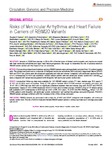Risks of ventricular arrhythmia and heart failure in carriers of RBM20 variants

Use este enlace para citar
http://hdl.handle.net/2183/34169Coleccións
- INIBIC-ICATC - Artigos [174]
Metadatos
Mostrar o rexistro completo do ítemTítulo
Risks of ventricular arrhythmia and heart failure in carriers of RBM20 variantsAutor(es)
Data
2023-10Cita bibliográfica
Cannie DE, Protonotarios A, Bakalakos A, Syrris P, Lorenzini M, De Stavola B, Bjerregaard L, Dybro AM, Hey TM, Hansen FG, Navarro Peñalver M, Crespo-Leiro MG, Larrañaga-Moreira JM, de Frutos F, Johnson R, Slater TA, Monserrat L, Sengupta A, Mestroni L, Taylor MRG, Sinagra G, Bilinska Z, Solla-Ruiz I, Arana Achaga X, Barriales-Villa R, Garcia-Pavia P, Gimeno JR, Dal Ferro M, Merlo M, Wahbi K, Fatkin D, Mogensen J, Rasmussen TB, Elliott PM. Risks of ventricular arrhythmia and heart failure in carriers of RBM20 variants. Circ Genom Precis Med. 2023 Oct;16(5):434-441.
Resumo
[Abstract] Background: Variants in RBM20 are reported in 2% to 6% of familial cases of dilated cardiomyopathy and may be associated with fatal ventricular arrhythmia and rapid heart failure progression. We sought to determine the risk of adverse events in RBM20 variant carriers and the impact of sex on outcomes.
Methods: Consecutive probands and relatives carrying RBM20 variants were retrospectively recruited from 12 cardiomyopathy units. The primary end point was a composite of malignant ventricular arrhythmia (MVA) and end-stage heart failure (ESHF). MVA and ESHF end points were also analyzed separately and men and women compared. Left ventricular ejection fraction (LVEF) contemporary to MVA was examined. RBM20 variant carriers with left ventricular systolic dysfunction (RBM20LVSD) were compared with variant-elusive patients with idiopathic left ventricular systolic dysfunction.
Results: Longitudinal follow-up data were available for 143 RBM20 variant carriers (71 men; median age, 35.5 years); 7 of 143 had an MVA event at baseline. Thirty of 136 without baseline MVA (22.0%) reached the primary end point, and 16 of 136 (11.8%) had new MVA with no significant difference between men and women (log-rank P=0.07 and P=0.98, respectively). Twenty of 143 (14.0%) developed ESHF (17 men and 3 women; log-rank P<0.001). Four of 10 variant carriers with available LVEF contemporary to MVA had an LVEF >35%. At 5 years, 15 of 67 (22.4%) RBM20LVSD versus 7 of 197 (3.6%) patients with idiopathic left ventricular systolic dysfunction had reached the primary end point (log-rank P<0.001). RBM20 variant carriage conferred a 6.0-fold increase in risk of the primary end point.
Conclusions: RBM20 variants are associated with a high risk of MVA and ESHF compared with idiopathic left ventricular systolic dysfunction. The risk of MVA in male and female RBM20 variant carriers is similar, but male sex is strongly associated with ESHF.
Palabras chave
Dilated cardiomyopathy
Heart failure
Sudden cardiac death
Heart failure
Sudden cardiac death
Versión do editor
Dereitos
Atribución 3.0 España
ISSN
2574-8300






